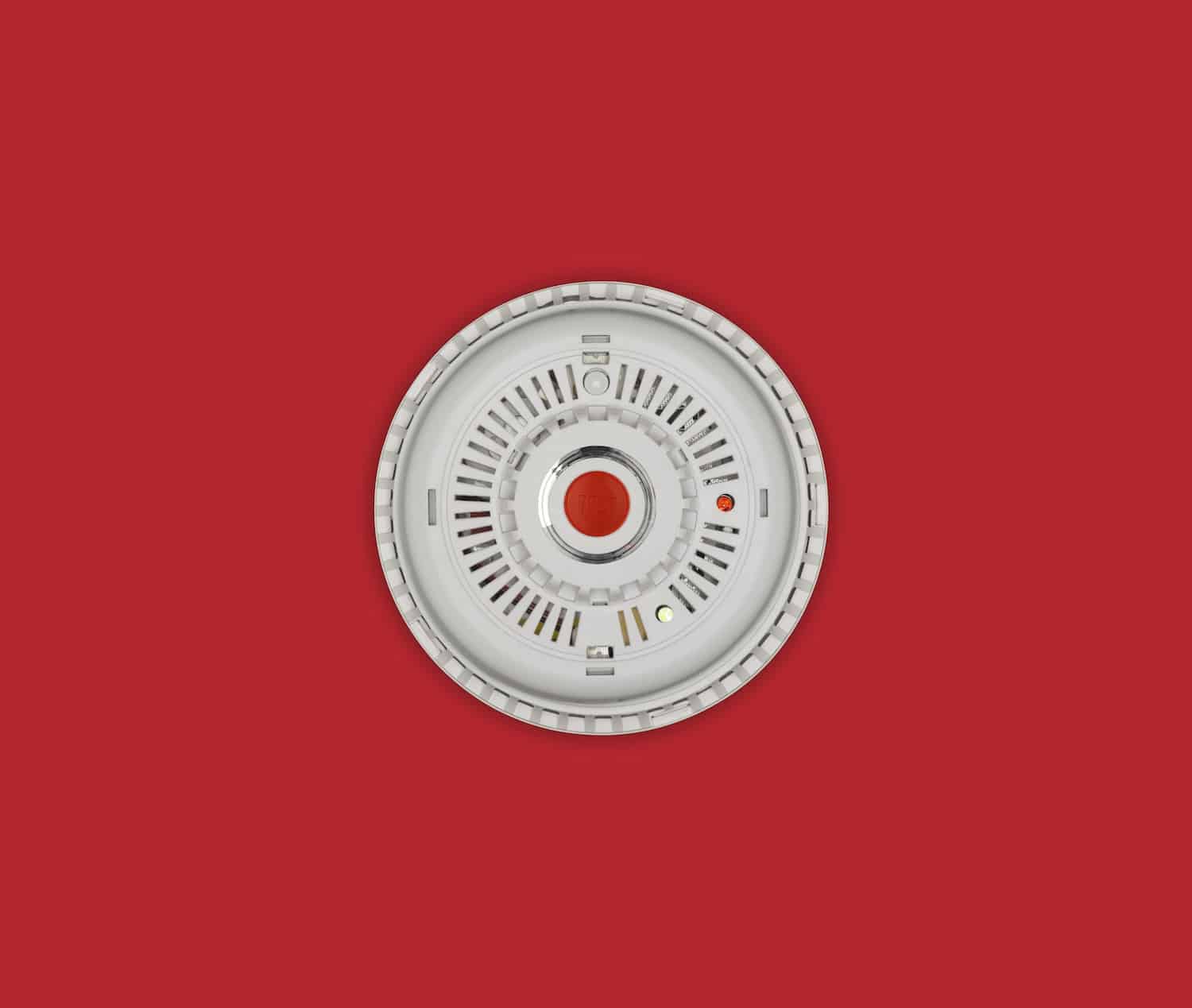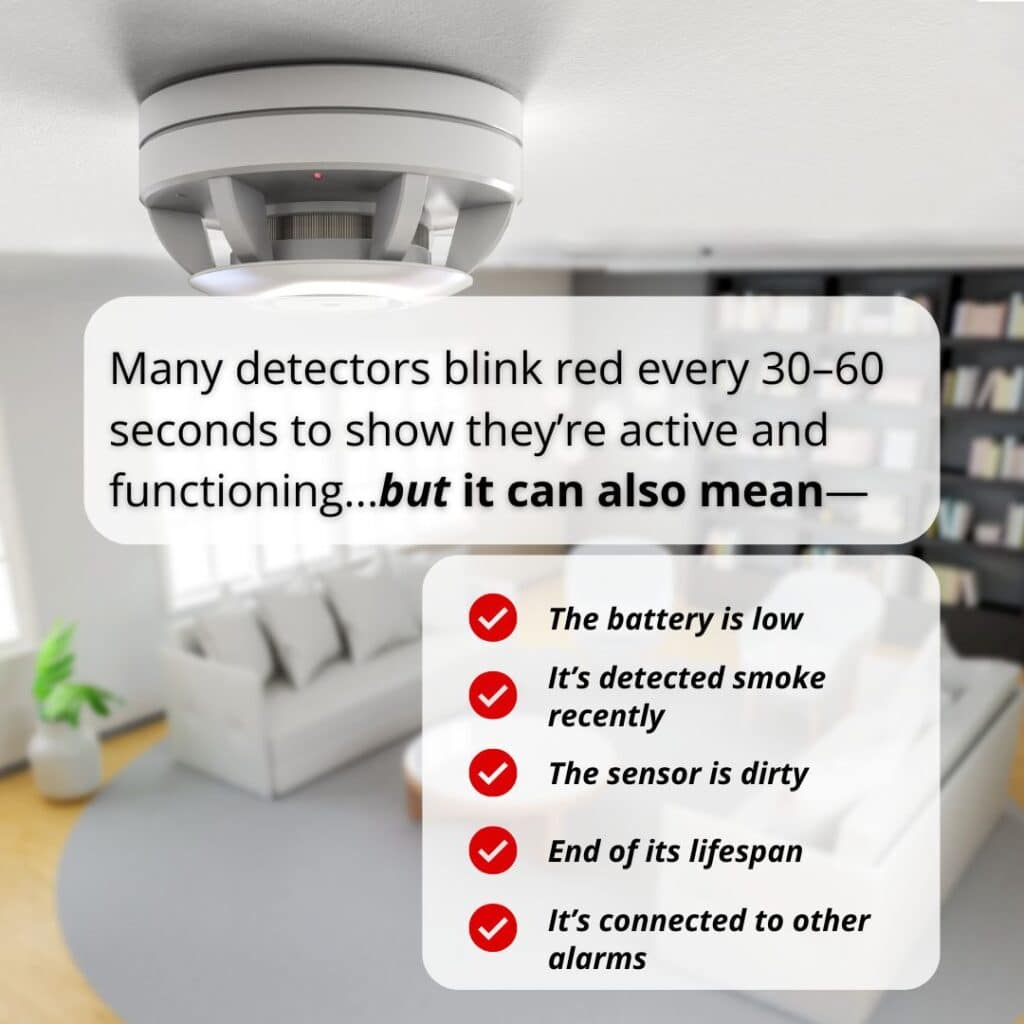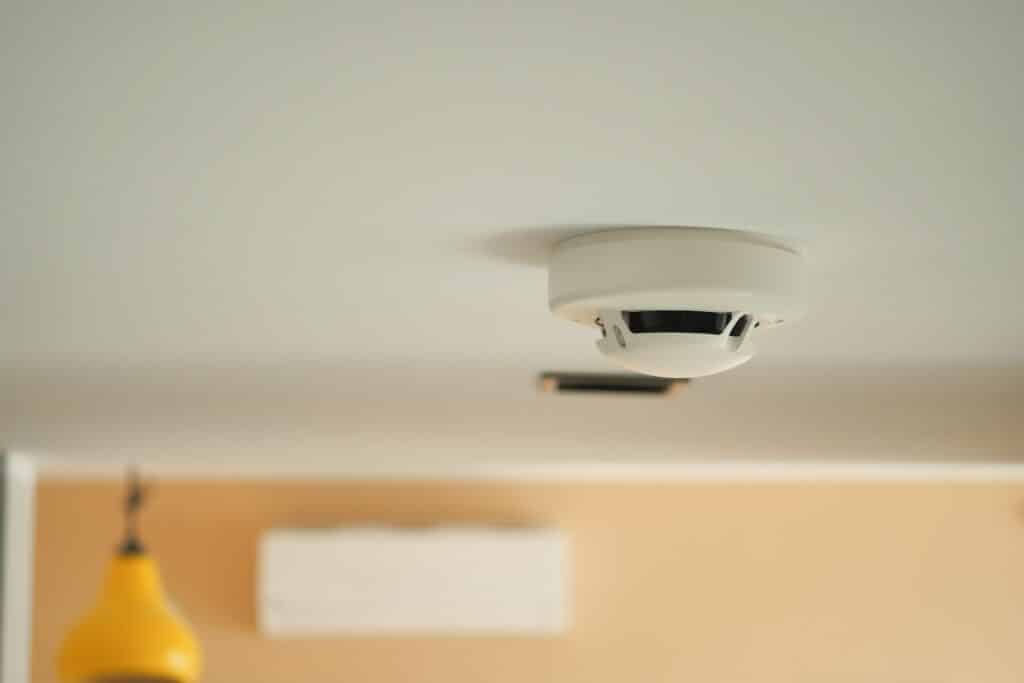
A blinking red light on a smoke detector can be confusing, but it’s not always a cause for alarm. In many cases, it’s a normal part of how the device operates. Other times, it signals a low battery, sensor issue, or that the detector is reaching the end of its lifespan.
Knowing what the blinking means—and when to take action—keeps your home safe. This is your guide to diagnosing, troubleshooting, and knowing when to replace your detectors (or call a professional for help).
Why Smoke Detectors Blink Red
A blinking red light on a smoke detector can mean different things depending on the model, but it’s always a signal worth paying attention to.
Some blinks are part of normal operation, while others warn of an issue that needs fixing. The most common reasons include:
- It’s working properly – Many detectors blink red every 30–60 seconds to show they’re active and functioning.
- The battery is low – A flashing red light, especially if paired with a chirping sound, means it’s time to replace the battery.
- It recently detected smoke – Some detectors continue blinking red for a while after an alarm goes off as a reminder that smoke was present.
- The sensor is dirty – Dust, debris, or even small insects inside the detector can interfere with its function, causing false alarms or a blinking light.
- It’s reaching the end of its lifespan – Smoke detectors typically last about 10 years. If the light keeps flashing despite a fresh battery and cleaning, the unit may need replacing.
- It’s connected to other alarms – In some interconnected systems, one detector blinking red might mean another one has detected smoke or an issue elsewhere in the home.
If your smoke detector is blinking red and behaving differently than usual, it’s a good idea to check the manual or test the unit.

Decoding the Blinks
A blinking red light isn’t always a problem, but if it’s behaving differently than usual, a few quick steps can help you figure out what’s going on.
Start with the user manual—every smoke detector model has different light and sound signals, and the manual will tell you exactly what the blinking pattern means.
If you don’t have a copy, the manufacturer’s website likely has a digital version.
Next, pay attention to how the light is blinking. A slow, steady blink often means the detector is functioning normally. Fast or irregular flashes—especially if there’s also a chirping sound—usually indicate a low battery, a sensor issue, or the need for a reset.
Press the test button to check if the detector is working. If the alarm sounds loud and clear, the unit is still functional. When there’s no sound or it’s weak, the battery or the detector itself may need replacing.
If the detector hasn’t been cleaned in a while, dust or debris buildup could be interfering with the sensor. A gentle vacuum or a quick spray of compressed air can remove particles that might be causing false signals.
Finally, check the installation date. Most smoke detectors last about 10 years. If yours is approaching that age, the blinking red light could be a sign it’s time for a replacement.
Addressing Your Blinking Smoke Detector
Once you’ve figured out why your smoke detector is blinking red, the next step is fixing it. The right solution depends on the cause:
- If the battery is low – Replace it with a fresh one. If the light keeps blinking, reset the detector by holding the test button for about 15 seconds.
- If it recently detected smoke – Some models continue blinking for a while after an alarm goes off. Let it run its course, but if the blinking doesn’t stop, try a reset.
- If the sensor is dirty – Dust and debris can interfere with the detector. Gently vacuum around the vents or use compressed air to clear out buildup.
- If it’s an interconnected system alert – Check all smoke detectors in your home. A blinking light on one unit may mean another detector detected an issue.
- If it’s nearing the end of its lifespan – Smoke detectors typically last about 10 years. If yours is older, a persistent red blink could be a sign that it’s time for a replacement.
If you’ve tried these steps and the blinking red light continues—or if you have a hardwired detector with unusual behavior—it may be a wiring issue or a malfunction that requires professional help.
The Best Home Smoke Detectors
A reliable smoke detector is essential for home safety. Some models offer better performance, fewer false alarms, and additional features like smart alerts or dual-sensor technology.
Top-Rated Smoke Detectors
- Google Nest Protect – A smart smoke and carbon monoxide detector with mobile alerts, voice notifications, and a self-testing feature.
- First Alert SA320CN – A dual-sensor detector that combines ionization and photoelectric technology for better fire detection.
- Kidde i4618AC – A hardwired detector with a battery backup, ensuring protection even during power outages.
- X-Sense XS01-WT – A compact, interconnected wireless smoke detector that allows multiple units to sync for full-home coverage.
- BRK 7010B – A hardwired photoelectric smoke alarm designed to reduce false alarms from cooking and steam.
When choosing a smoke detector, consider your home’s layout, whether you prefer battery-powered or hardwired units, and if smart features would improve your safety setup.

Other Smoke Detector Maintenance
Regular maintenance keeps your smoke detectors working properly and helps prevent false alarms or missed warnings.
- Test detectors monthly by pressing the test button to make sure they work.
- Replace batteries at least once a year, or sooner if the detector starts chirping.
- Keep detectors clean by vacuuming or using compressed air to remove dust and debris.
- Follow the 10-year rule and replace detectors when they reach the end of their lifespan.
- Make sure detectors are installed in the right places, including every bedroom, hallway, and floor level for the best protection.
When to Call a Professional
Most smoke detector issues are easy to fix, but there are times when it’s best to bring in a professional. Consider calling for help if:
- The blinking red light continues after replacing the battery, resetting the unit, and cleaning the sensor.
- Hardwired detectors are malfunctioning, which could indicate a wiring issue.
- The alarms go off randomly or too frequently without an obvious cause.
- You’re unsure if your smoke detectors are installed in the right locations or need an upgrade.
A home inspector or electrician can assess your detectors, troubleshoot any problems, and ensure your home’s fire safety system is up to code.
Conclusion
A blinking red light on a smoke detector isn’t always a sign of danger, but it’s a signal that shouldn’t be ignored.
If you’re experiencing persistent issues with your smoke detectors or want a professional assessment of your home’s safety features, call All Coast Home Inspections. Our experts provide thorough inspections to ensure your fire safety systems are in top shape.


